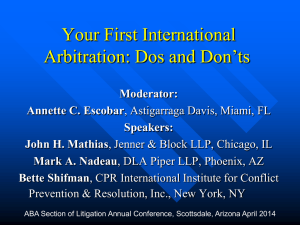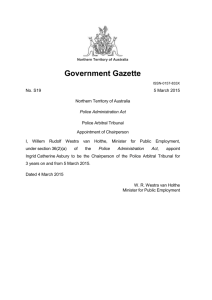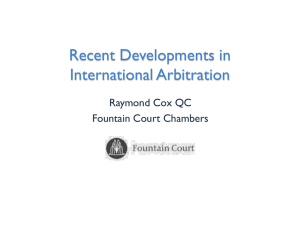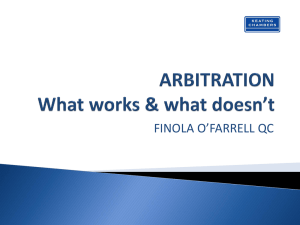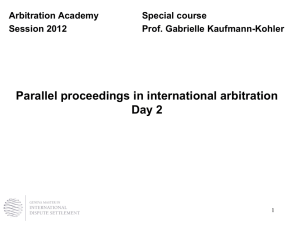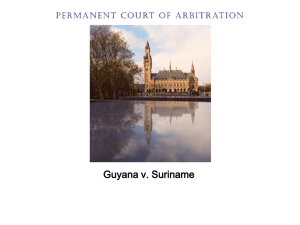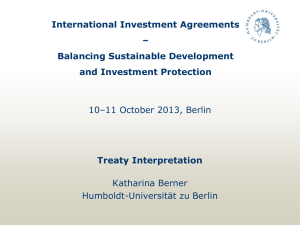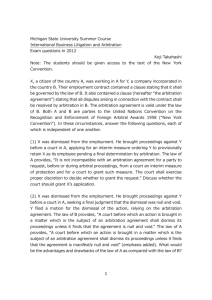2.1. Notice of Arbitration - Construction Procurement Reform
advertisement
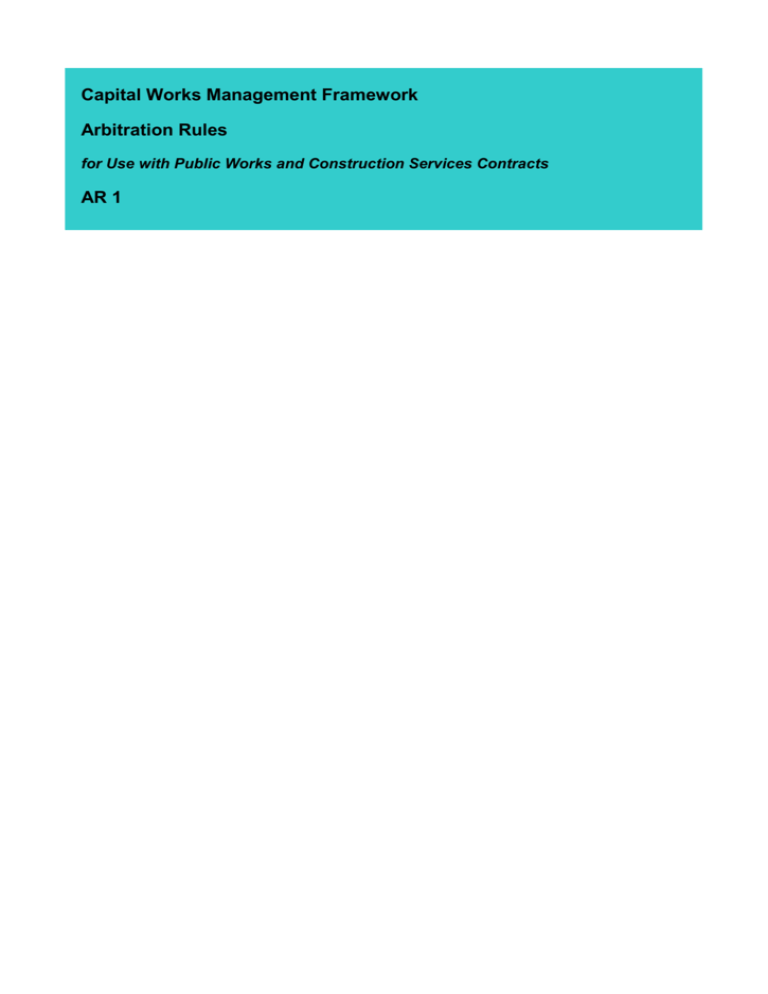
Capital Works Management Framework Arbitration Rules for Use with Public Works and Construction Services Contracts AR 1 Arbitration Rules Document Reference AR 1 v1.2 24 September 2014 © 2014 Office of Government Procurement Published by: Office of Government Procurement Department of Public Expenditure and Reform Government Buildings Upper Merrion Street Dublin 2 AR 1 v1.2 24/09/2014 1 Contents _______________________________________________ 1. INTRODUCTORY RULES ..............................................................................................................................4 1.1. PURPOSE..................................................................................................................................................4 1.2. THE CONTRACT .......................................................................................................................................4 1.3. ARBITRAL TRIBUNAL .............................................................................................................................4 1.4. PLACE AND LANGUAGE OF ARBITRATION ........................................................................................4 1.5. TIME...........................................................................................................................................................4 1.6. ARBITRATION ACT 2010 .........................................................................................................................4 1.7. WAIVER .....................................................................................................................................................4 2. INITIATING ARBITRAL PROCEEDINGS ......................................................................................................4 2.1. NOTICE OF ARBITRATION......................................................................................................................4 2.2. RESPONSE TO NOTICE OF ARBITRATION ..........................................................................................5 2.3. NO DELAY IN FORMING ARBITRAL TRIBUNAL ...................................................................................6 3. FORMING THE ARBITRAL TRIBUNAL ........................................................................................................6 3.1. NUMBER OF ARBITRATORS ..................................................................................................................6 3.2. APPOINTMENT OF SOLE ARBITRATOR BY PARTIES ........................................................................6 3.3. APPOINTMENT OF TRIBUNAL OF THREE ARBITRATORS BY PARTIES AND ARBITRATORS ......7 3.4. APPOINTMENT BY APPOINTING BODY ................................................................................................7 3.5. ACCEPTANCE OF APPOINTMENT .........................................................................................................7 3.6. INDEPENDENCE AND IMPARTIALITY ...................................................................................................8 3.7. VACANCIES AND TRUNCATED TRIBUNAL ..........................................................................................8 4. CONDUCTING THE ARBITRAL PROCEEDINGS ........................................................................................8 4.1. GENERAL ..................................................................................................................................................8 4.2. REPRESENTATION AND COMMUNICATIONS ......................................................................................9 4.3. CASE MANAGEMENT CONSULTATIONS ..............................................................................................9 4.4. WRITTEN STAGE ...................................................................................................................................10 4.5. CLARIFICATION AND INFORMATION ..................................................................................................11 4.6. DISCLOSURE OF DOCUMENTS ...........................................................................................................11 AR 1 v1.2 24/09/2014 2 4.7. WITNESSES STATEMENTS ..................................................................................................................14 4.8. EXPERT WITNESSES ............................................................................................................................15 4.9. DOCUMENTARY EVIDENCE .................................................................................................................15 4.10. EVIDENCE GENERALLY .......................................................................................................................16 4.11. ORAL HEARING .....................................................................................................................................16 4.12. DEFAULT ................................................................................................................................................17 4.13. FAST TRACK ..........................................................................................................................................17 5. ARBITRATORS' FEES AND EXPENSES ...................................................................................................18 5.1. REASONABLE ........................................................................................................................................18 5.2. DEPOSIT .................................................................................................................................................18 6. AWARD.........................................................................................................................................................19 6.1. SEPARATE AWARDS ............................................................................................................................19 6.2. TIME FOR AWARD .................................................................................................................................19 6.3. PUBLICATION.........................................................................................................................................19 6.4. INTEREST AND COSTS .........................................................................................................................19 7. TERMS OF APPOINTMENT OF ARBITRATOR .........................................................................................20 AR 1 v1.2 24/09/2014 3 1. INTRODUCTORY RULES 1.1. Purpose 1.2. 1.1.1. The purpose of these Rules is to facilitate the fair, expeditious, and efficient resolution of the disputes in arbitration, avoiding delay and unnecessary or disproportionate expense. 1.1.2. The parties and the arbitral tribunal must take all steps reasonably required to facilitate that purpose. The Contract 1.2.1. 1.3. Arbitral Tribunal 1.3.1. 1.4. 1.5. 1.7. In these Rules the term arbitral tribunal means the sole arbitrator or the arbitrators if there is more than one (acting by majority decision or, under Rule 4.1.3, by one of the arbitrators). Place and Language of Arbitration 1.4.1. The place of arbitration is to be Ireland. 1.4.2. The English (or, if agreed or required by law, Irish) language is to be used in the arbitral proceedings. All notices and other documents used in the arbitral proceedings must be in that language. A party submitting a document in another language must submit at the same time a translation into English (or Irish if applicable). Time 1.5.1. 1.6. These Rules apply subject to and in accordance with the contract providing for arbitration under them (the Contract), and subject also to any agreement between the parties. Any time period in these Rules running from a notice runs from the day after the notice has been received. If the final day of the period falls on a day that is not a business day (that is, Saturday, Sunday, a public holiday under the Organisation of Working Time Act 1997, Good Friday, or Christmas Eve) the period will be extended until the next business day. Arbitration Act 2010 1.6.1. References to Sections are to sections of the Arbitration Act 2010 as may be amended. References to Articles are to articles of the UNCITRAL Model Law on International Commercial Arbitration, Schedule 1 to the Arbitration Act 2010, as may be amended by amending Irish legislation. 1.6.2. The powers of the arbitral tribunal under these Rules are additional to the powers under the law. Waiver 1.7.1. In addition to the waiver in Article 4, a party who knows about a failure of the arbitral tribunal or another party to comply with these Rules or any other obligation in connection with the arbitral proceedings and does not object promptly waives the right to object. 2. INITIATING ARBITRAL PROCEEDINGS 2.1. Notice of Arbitration AR 1 v1.2 24/09/2014 4 2.2. 2.1.1. When arbitral proceedings for a particular dispute may be commenced under the Contract, a party may commence arbitral proceedings by sending the others a notice of arbitration. 2.1.2. The notice of arbitration is effective if sent in accordance with details for such communications stated in the Contract, or in accordance with Article 3. 2.1.3. A notice of arbitration must include all of the following: (1) Identification of the dispute (2) A demand that the dispute be referred to arbitration (3) The names and contact details of the parties, including contact details for communications in the arbitral proceedings to the party giving the notice or its representative (4) Identification of the Contract, including the text of the arbitration agreement invoked (5) A brief description of the claim and a statement of the amount involved, if any (6) The relief or remedy sought (7) Confirmation that any conditions precedent to arbitration under the Contract have been satisfied (8) A proposal of the number of arbitrators (9) Whether it is proposed that the arbitral proceedings be conducted on the fast track or not. 2.1.4. The notice of arbitration must be accompanied by a separate document giving the names and contact details of at least three persons proposed for appointment as arbitrator if a sole arbitrator is proposed, and the name and contact details of one person chosen as arbitrator if an arbitral tribunal of three arbitrators is proposed. 2.1.5. The notice of arbitration may be accompanied by a statement of case complying with Rule 4.4. Response to Notice of Arbitration 2.2.1. 2.2.2. A party receiving a notice of arbitration must, within 21 days after receiving it, send a response to the party who sent it and any other parties identified in the notice of arbitration, which must include all of the following: (1) The name of the party giving the response and contact details for communications in the arbitral proceedings to that party or its representative; and (2) A response to each item in the notice of arbitration under Rule 2.1.3. A response to a notice of arbitration may also include any or all of the following: (1) Any plea that an arbitral tribunal to be constituted under these Rules lacks jurisdiction (2) A brief description of any claims that the party making the response wishes to bring forward in the arbitral proceedings, including, in respect of the claim (a) AR 1 v1.2 24/09/2014 An indication of the amounts involved and the relief or remedies sought and 5 (b) 2.3. Confirmation that any conditions precedent to arbitration under the Contract have been satisfied. 2.2.3. If the notice of arbitration proposes that a sole arbitrator be appointed and is accompanied by the names and contact details of persons proposed for appointment as sole arbitrator, and a sole arbitrator is to be appointed (either under Rule 3.1 or the Contract or by agreement), then the response to notice of arbitration must be accompanied by a separate document stating whether the party giving the response agrees to the appointment of any of the persons proposed by the party giving the notice of arbitration, and if not, by the names of at least three persons proposed by the party giving the response for appointment as sole arbitrator. 2.2.4. If the notice of arbitration proposes that an arbitral tribunal of three arbitrators should be appointed and is accompanied by the name and contact details of a person chosen by the party giving the notice of arbitration for appointment to the arbitral tribunal, and if an arbitral tribunal of three arbitrators is to be appointed (either under Rule 3.1 or the Contract or by agreement), then the response to notice of arbitration must be accompanied by a separate document giving the name and contact details of one person chosen as arbitrator by the party giving the response. If they do not agree, Rule 3.4.1 will apply. 2.2.5. If two or more parties are to respond to a notice of arbitration, they should try to agree and give the notice under Rule 2.2.3 or 2.2.4 jointly. 2.2.6. A response to a notice of arbitration may be accompanied by a statement of case for any claim that the party giving the response indicates an intention to bring forward in the arbitral proceedings. It must comply with Rule 4.4. No Delay in Forming Arbitral Tribunal 2.3.1. A controversy about the sufficiency of a notice of arbitration or any response to it (including issues of jurisdiction arising from them) should not hinder or delay the formation of the arbitral tribunal, which will have power to resolve any such controversy. 3. FORMING THE ARBITRAL TRIBUNAL 3.1. Number of Arbitrators 3.1.1. Unless a different number of arbitrators has been agreed in the Contract, or as a result of the exchange of notice of arbitration and response, or otherwise, the number of arbitrators will be as follows: 3.1.2. If the total relief claimed is (1) An amount or amounts of money less than €10 million in total or (2) An extension of time or (3) Both an amount or amounts of money less than €10 million in total and an extension of time there will be one arbitrator. 3.1.3. 3.2. Otherwise there will be three arbitrators. Appointment of Sole Arbitrator by Parties 3.2.1. AR 1 v1.2 24/09/2014 This Rule 3.2 applies when there is to be a sole arbitrator. 6 3.2.2. 3.3. 3.4. 3.5. If, following exchange of names under Rule 2 or otherwise, the parties agree on the identity of the arbitrator, the party who gave the notice of arbitration must write to the person so selected enclosing a copy of the notice of arbitration and each response (but not the separate communications about selecting the arbitrator) and confirmation of the parties' agreement to the appointment. Appointment of Tribunal of Three Arbitrators by Parties and Arbitrators 3.3.1. This Rule 3.3 applies when there are to be three arbitrators. 3.3.2. Unless otherwise provided in these rules or agreed by the parties (1) One arbitrator is chosen by the party (or parties) who served the notice of arbitration. (2) One arbitrator is chosen by the other party (or parties). (3) The third arbitrator, who acts as presiding arbitrator of the arbitral tribunal, is chosen by the other two. Appointment by Appointing Body 3.4.1. If the arbitral tribunal has not been formed within 42 days after the notice of arbitration was sent, any party may then apply to the person or body named in the Contract for this purpose (the appointing body) requesting appointment to any unfilled vacancies on the arbitral tribunal. 3.4.2. The application must be in writing, copied to the other parties, and accompanied by (1) A copy of the notice of arbitration and all responses and (2) Any fee required by the appointing body. 3.4.3. A party may inform the appointing body of specific reasons why a particular person should not be appointed as arbitrator, for example because of previously acting as conciliator for the same dispute. The fact that a person has previously been proposed by one party but not accepted is not by itself reason for that person not to be appointed by the appointing body, and should not be disclosed to the appointing body or to the arbitral tribunal. 3.4.4. The appointing body is to make the appointment and notify the parties and the person appointed of the appointment. The notice should be given within 14 days after the appointing body receives the application. If notice is not given within 21 days after the appointing body receives the application, it may be taken that the appointing body has failed to make the appointment, and Article 11(4) will apply. Acceptance of Appointment 3.5.1. A person (whether invited by the parties, chosen by a party or the other arbitrators, or appointed by the appointing body) who accepts the appointment must so notify the parties in writing. 3.5.2. If there is a sole arbitrator, the date of receipt by all parties of the notification of that person's acceptance of his or her appointment will be the date on which that arbitrator's appointment is completed. If there are to be three arbitrators, their appointment will be completed when all three have accepted appointment, and all the parties have received notice of the acceptance. 3.5.3. Upon acceptance of appointment an arbitrator must provide the parties with terms of appointment including the basis for charging fees and expenses. AR 1 v1.2 24/09/2014 7 3.6. 3.7. 3.5.4. If a person so invited or appointed has not notified the parties of acceptance of the appointment within 14 days after the invitation or notice of appointment was sent, it may be taken that the person has refused appointment, in which case either party may apply to the appointing body and Rule 3.4 will apply. 3.5.5. The date of formation of the arbitral tribunal will be the date on which the appointment of all the arbitrators has been completed. An arbitrator may not act until the arbitral tribunal has been formed. 3.5.6. Within 14 days after formation, the sole or presiding arbitrator must send the Office of Government Procurement, Public Procurement Policy Unit, Department of Public Expenditure and Reform, Government Buildings, Upper Merrion Street, Dublin 2, notice of the arbitral tribunal's formation together with a copy of the notice sent to each arbitrator by a party or the appointing body. The sole or presiding arbitrator must send the parties a copy of this notice. Independence and Impartiality 3.6.1. All the arbitrators must be and remain at all times impartial and independent of the parties, regardless of how they were appointed. 3.6.2. A prospective arbitrator must make the disclosure required by Article 12 before accepting appointment. 3.6.3. No arbitrator, whether before or after appointment, may advise a party in connection with the arbitral proceedings. Vacancies and Truncated Tribunal 3.7.1. If a vacancy occurs in the arbitral tribunal, it may, following written notice to the parties, decide to proceed with the arbitral proceedings without a substitute arbitrator being appointed. The arbitral tribunal should take into account the views of the parties and the stage of the arbitral proceedings. The arbitral tribunal should notify the parties of its decision in this regard as soon as practicable after a vacancy occurs. Unless the arbitral tribunal decides to proceed without a substitute arbitrator being appointed, Article 15 will apply. 3.7.2. When a vacancy is filled the arbitral tribunal must decide how to proceed with the arbitral proceedings, including whether to repeat any hearings previously held. 3.7.3. If an arbitrator refuses or persistently fails to participate in the arbitral tribunal's deliberations, the other arbitrators may, following written notice to the arbitrator in question, any appointing body that appointed that arbitrator, and the parties, decide to proceed with the arbitral proceedings without the participation of the arbitrator in question. The other arbitrators should take into account any explanation offered by the arbitrator in question for not participating, the views of the parties, and the stage of the arbitral proceedings. An award made without the participation of an arbitrator should state the reasons why the other arbitrators decided to proceed without that arbitrator's participation. 3.7.4. In this Rule 3.7, proceed includes making any decision, ruling, or award. 4. CONDUCTING THE ARBITRAL PROCEEDINGS 4.1. General 4.1.1. The parties may agree on the conduct of their arbitral proceedings, subject to Article 18 and Rule 1.1. 4.1.2. The parties must comply with the arbitral tribunal's rulings and directions. AR 1 v1.2 24/09/2014 8 4.2. 4.3. 4.1.3. One arbitrator may, with the consent of the arbitral tribunal or all the parties, make procedural and case management rulings and directions. Procedural rulings and directions of that arbitrator will be considered made by the arbitral tribunal. 4.1.4. The arbitral tribunal may extend any time limits set by its directions, by these Rules, or by agreement for actions by the parties in the conduct of the arbitral proceedings. Representation and Communications 4.2.1. Each party may be represented by persons chosen by it. 4.2.2. Written communications with the arbitral tribunal and other written communications under these Rules must be sent by a means that provides a record of their transmission. When reasonably practicable, communications other than notice of arbitration should be by email. 4.2.3. Written communications under these Rules to a party (except notice of arbitration) are effective if sent in accordance with the details given in that party's notice of arbitration or response to notice of arbitration, or updated details given by that party or its representative. 4.2.4. Except at hearings and meetings which all parties have been given an opportunity to attend, communication between a party and the arbitral tribunal concerning the substance of the dispute must be in writing, and copied at the same time to all the other parties, and marked as such. No party may communicate privately with the arbitral tribunal or any arbitrator concerning the substance of the dispute. Case Management Consultations 4.3.1. Within 21 days after the arbitral tribunal has been formed the parties and the arbitral tribunal should have completed initial case management consultations by meeting, video or telephone conference, exchange of correspondence, or otherwise, as directed by the arbitral tribunal. At the initial case management consultations the parties and the arbitral tribunal should consider the following: (1) The likely duration of the proceedings (2) Whether the proceedings should be on the fast track (3) The timetable for the proceedings (4) Whether any issues should be dealt with separately, including by separate award (5) Efficient electronic and other means of communication (6) Arrangements for disclosure of documents and other information (7) Whether an oral hearing is required, and if so: identification of the particular factual and legal issues for hearing, its likely duration, dates, venue, any recording arrangements, and other administrative arrangements (8) Arrangements in relation to evidence, including expert evidence (9) Anything else relevant to Rule 1.1. 4.3.2. At the conclusion of the initial procedural consultations the arbitral tribunal should issue directions including a timetable. 4.3.3. The parties must comply with any timetable issued by the arbitral tribunal and may not amend it without the arbitral tribunal's consent. AR 1 v1.2 24/09/2014 9 4.3.4. 4.4. The arbitral tribunal should update and amend the timetable, issue further directions for the conduct of the arbitral proceedings, and hold further case management consultations, all to the extent consistent with Rule 1.1. Written Stage 4.4.1. Unless the arbitral tribunal directs otherwise, the written stage of the proceedings will be as set out in this Rule 4.4. 4.4.2. Within 28 days after the arbitral tribunal is formed, each party making a claim must send to the other parties a written statement of case (unless a statement of case complying with this Rule 4.4 was delivered with its notice of arbitration or response to notice of arbitration). 4.4.3. A statement of case must include all of the following: (1) The facts supporting the claim (2) Copies of any documents relied on or referred to, subject to Rule 4.4.8 (3) A signed witness statement complying with Rule 4.7 from any witness whose evidence is relied upon (4) The legal grounds and arguments supporting the claim, and copies of authorities relied on (5) Details of the relief or remedy sought. 4.4.4. Each party receiving a statement of case must, within 42 days after receiving it, serve on each other party a written statement of defence responding to the statement of case. 4.4.5. A statement of defence must include all of the following: (1) Response to the factual allegations in the statement of defence (2) A statement of any other facts relied upon (3) Copies of any additional documents relied on, subject to Rule 4.4.8 (4) A signed witness statement complying with Rule 4.7 from any witness whose evidence is relied upon (5) Response to the legal grounds and arguments in the statement of case, any other grounds and arguments relied upon, and copies of additional authorities relied on. 4.4.6. A party sending a statement of case or defence must, at the same time, send a copy to the arbitral tribunal. If the arbitral tribunal has not yet been formed, each party must send to the arbitral tribunal, promptly after it is formed, a copy of any statements of case or defence that it has already sent (copying the other parties with this communication). 4.4.7. The statements of case and defence must be compiled in paginated, tabbed, and indexed books, subject to Rule 4.4.8. Searchable electronic copies of all the contents must also be provided if practicable. 4.4.8. It is not necessary to include documents that have already been included by another party in a submission. If provision of hard copies of any documents is not reasonably practicable, with the permission of the arbitral tribunal the parties may instead: (1) AR 1 v1.2 24/09/2014 Provide an electronic bundle or 10 (2) 4.4.9. 4.5. 4.6. Disclose the documents when sending their statements of case or defence and Rule 4.6 will apply It is for the arbitral tribunal to decide what further statements are required, if any, and to fix a time for sending them. Clarification and Information 4.5.1. A party may request another to provide clarification or information, without seeking permission from the arbitral tribunal. The request should be concise and strictly confined to matters that are reasonably necessary and proportionate to enable the requesting party to prepare its own case or to understand the case it has to meet. Requests should be made as far as possible in a single document and not piecemeal. If convenient, they may be prepared in such a way that the response can be given on the same document, with numbered request items on the left side of each sheet so that the response items can then be added on the right. The request must state a date by which a response is expected, and the time given must be reasonable. 4.5.2. If a party objects to complying with a request for clarification or information or part of it or is unable to comply within the time stated in the request, it must so notify the other parties and the arbitral tribunal promptly and in any event within that time, giving reasons and, if relevant, a date by which it expects to be able to comply. 4.5.3. A party who has requested clarification or information under Rule 4.5.1 may, if the requested clarification or information is not provided within the time requested, seek directions from the arbitral tribunal. 4.5.4. Requests for clarification or information and responses must be signed and dated and sent to all parties and the arbitral tribunal. If reasonably practicable, they should be sent by email. Disclosure of Documents 4.6.1. The parties and the arbitrator must pay particular attention to Rule 1.1 in relation to disclosure of documents. 4.6.2. As soon as arbitral proceedings are reasonably contemplated, each party must take all reasonable steps to preserve documents that are, or are reasonably likely to be, subject to disclosure in the arbitral proceedings. This includes preserving electronically stored information and other documents in readily retrievable form even if they would otherwise be deleted or destroyed in the ordinary course of business. 4.6.3. In these Rules, document means anything in which information of any description is recorded by any means, including without limitation: writings, communications, pictures, drawings, programmes, and data or any kind, whether recorded or maintained on paper or by electronic, audio, visual, or any other means. 4.6.4. As part of the initial case management consultations the parties must consider together whether they require disclosure of documents. 4.6.5. If any party considers that disclosure of documents is or may be required, the parties must cooperate to do all of the following: AR 1 v1.2 24/09/2014 (1) Identify the documents likely to be relevant, the individuals likely to have them or know where they might be located, their location and likely volume (whether held as hard copies or electronically) and the extent of each party's control of them (2) Assess whether any of the methods in paragraph (7) below may assist in locating electronically stored information efficiently 11 (3) Estimate the likely volume and cost of disclosing the documents identified including the approximate number of paper and electronic documents, the estimated cost of assembling and disclosing them (including reviewing for relevance, privilege and other grounds to withhold production, and listing the documents), and whether specialist expertise is required to help make informed decisions (including an accurate assessment of the likely costs involved) (4) Assess the extent to which information may be obtained by requesting it under Rule 4.5 rather than through disclosure of documents (5) Assess and discuss with each other whether the estimated cost is proportionate taking account of all of the following: (a) The nature and complexity of the arbitral proceedings and the amounts in dispute (b) The number of documents involved (c ) The ease and expense of retrieving the documents (d) The significance of any documents likely to disclosed (e) Any other relevant circumstances. (6) Try to agree on narrowly tailored categories of documents to be disclosed by the parties, and for each category seek to limit disclosure to what is reasonable and proportionate. This may be done by, for example, specifying subject matter, date range, types of documents, and key individuals (for example, those who worked on site or are at a specified management level) (7) Try to agree what methods and strategies are appropriate to conduct a reasonable and proportionate search for the documents in the agreed categories, such as appropriate keyword searches, other automated searches and techniques for culling documents (including concept searching, clustering technology, document prioritisation technology, email threading, and any other new tool or technique), methods for identifying duplicate documents, and use of specialist assistance to locate documents efficiently and accurately (8) Discuss whether a staged approach may be appropriate, with different dates for different categories, date ranges, individuals or other sets of documents. 4.6.6. If agreement is reached on the matters in Rule 4.6.5, it must be set out in writing and sent to the arbitral tribunal. Any issue that is not agreed should be brought before the arbitral tribunal so that it can issue directions without delay. In directing disclosure the arbitral tribunal must take into account the matters in Rule 4.6.5. 4.6.7. A party's duty to disclose documents is limited to documents that are or have been in its control. For this purpose a party has or has had control of a document if it is or was in the party's physical possession, or the party has or has had a right to possession of the document, or it has had a right to inspect or take copies of it. 4.6.8. Subject to what is agreed or directed by the arbitral tribunal, a party who agrees or is directed to disclose documents must do all of the following within the time agreed or directed (1) AR 1 v1.2 24/09/2014 Search for the documents using the methods and strategies agreed or directed. 12 4.6.9. 4.6.10. (2) Send to the other parties and the arbitral tribunal a signed statement giving a narrative account of what the party has done to search for the documents, in order to demonstrate compliance with the agreement or direction (3) Make and send to the other parties and the arbitral tribunal a list of the documents being disclosed, which must (a) Identify the documents in a convenient order and manner and as concisely as possible. Normally the following information should be given for each document: a unique reference number, the date appearing on the document, the document type, the author and recipient, and the unique number of any parent document such as a covering letter or email (b) Identify in a similar manner the documents that are no longer in the party's control and what has happened to them (c ) Identify in a similar manner any documents that the party claims the right or duty not to produce, and state the grounds, and give enough information to demonstrate the right or duty (d) Be in both paper form (signed) and electronic spreadsheet form with no access restrictions. A party required to disclose a document must produce it to the other parties unless (1) The document is no longer in the party's control or (2) The party disclosing the document has a right or duty to withhold production, and has claimed that right when making disclosure. Documents must be produced within the time and in the manner agreed or directed. Subject to what is agreed or directed (1) Documents must be produced on suitable media with no restrictions on access, as multipage searchable PDF (or equivalent) images, with file names corresponding to the unique reference number on the list and that number also clearly marked on at least the first page of the document image (2) To the extent requested, documents must also be provided in native file format, and either the file name must be identified on the list, or the document reference number must be contained within the name of the native file format version of the document (3) A party must make the original of any document produced available for inspection by any party. 4.6.11. The arbitral tribunal may require a party to make available inspection and searching facilities using that party's own systems, so as to allow another party to avail of their search functionality. 4.6.12. The duty of disclosure extends until the arbitral proceedings are concluded. If a document to which that duty extends comes to a party's notice during the arbitral proceedings, it must notify the other parties and disclose and produce the document. 4.6.13. A party must disclose and produce a document if, in the course of complying with an agreement or direction for disclosure or otherwise, that party becomes aware of a document that (1) AR 1 v1.2 24/09/2014 Adversely affects its own case or 13 (2) Adversely affects another party's case or (3) Supports another party's case even if disclosure of the document was not required under the agreement or directions. 4.7. 4.6.14. If so requested by any party, a party who sends a statement of case or defence, witness statement, expert report, or other submission that includes or refers to a document must disclose and produce the document under this Rule 4.6. 4.6.15. Any controversies about disclosure or production of documents, including controversies about privilege or other grounds for withholding production, must be brought before the arbitral tribunal so that it can issue directions without delay. 4.6.16. If, in order to rule on a controversy about whether a party has a right or duty to withhold production of a document, it is necessary to examine the document, the arbitral tribunal may either (1) Examine the document itself or (2) In exceptional circumstances, after consulting the parties, appoint an independent and impartial expert to examine the document and report on the issue. If the arbitral tribunal, after considering the expert's report, decides that production be withheld, the expert should return the document to the party from whom it was received without disclosing its contents to the arbitral tribunal or the other parties. Witnesses Statements 4.7.1. It is not improper for a party or its representatives to interview witnesses and discuss their prospective evidence with them. But no party or its representatives may discuss the evidence or prospective evidence with a witness who has begun to give oral evidence until the witness is excused, except with the permission of the arbitral tribunal for exceptional reasons. 4.7.2. Witness statements should be written by the witnesses themselves. Any witness statement not written by the witness must state who wrote it and why. 4.7.3. Each witness statement must contain all of the following: 4.7.4. (1) The witness's full name and address, the witness's present and past relationship with the parties and, if relevant to the evidence, background, qualifications, training, and experience (2) A full and detailed description of the facts and source of the witness's information of those facts (3) An affirmation of the truth of the witness statement (4) The signature of the witness and the date and place of signing. A party may, with the permission of the arbitral tribunal and within the time directed, submit additional witness statements to those included with the statement of case or defence, including from persons from whom a witness statement was not previously provided, but only (1) AR 1 v1.2 24/09/2014 To respond to matters raised in another party's statement of defence, amended statement of case or defence, witness statement, expert report, or other submission made since the statement of case or defence was originally submitted or 14 4.7.5. 4.8. 4.9. (2) To introduce evidence of which the party providing the supplemental evidence has subsequently become aware and could not reasonably have been aware at the time of the original submission or (3) In other exceptional circumstances. Copies of documents referred to in a supplemental witness statement must be sent with the witness statement, but Rule 4.4.8 applies. Expert Witnesses 4.8.1. Expert evidence may be put forward only with the permission of the arbitral tribunal, and permission may be given on conditions. 4.8.2. Unless otherwise agreed or directed by the arbitral tribunal, expert evidence need not be included with the statements of case or defence. 4.8.3. If a party is permitted to call expert evidence (1) The other party must be given a reasonable opportunity to retain an expert witness in the same discipline (2) The arbitration tribunal should set a timetable for any or all of the following (a) Exchange of expert reports (b) Meetings of experts (c ) Joint experts reports identifying (i) Areas of agreement of fact and opinion and (ii) Areas of disagreement and the reasons for disagreement. 4.8.4. Copies of documents referred to in expert reports must be sent with the report, but Rule 4.4.8 applies. 4.8.5. The arbitral tribunal must consult with the parties before appointing an expert under Article 26. Documentary Evidence 4.9.1. 4.9.2. AR 1 v1.2 24/09/2014 A party may, with the permission of the arbitral tribunal and within the time directed, submit additional documentary evidence not included in its statement of case or defence or other statements directed by the arbitral tribunal, but only (1) If the document was not available to the party at the time of the original submission, for example because it was subsequently disclosed by another party or (2) To respond to matters raised in another party's statement of defence, amended statement of case or defence, witness statement, expert report, or other submission, made since the statement of case or defence was originally submitted or (3) In other exceptional circumstances. The parties and the arbitral tribunal should discuss how documentary evidence is to be submitted to the arbitral tribunal. Any documents submitted to the arbitral tribunal (unless included in statements of case or defence, witness statements, expert reports, or other previous submissions) should be assembled in agreed, paginated, indexed books. 15 4.9.3. 4.10. 4.11. Any party objecting to the admissibility of a document included in a statement of case or defence, witness statement, expert report, or otherwise submitted to the arbitral tribunal must raise its objection promptly and in any event within the time directed by the arbitral tribunal, failing which the document will be considered entered in evidence. Documents in agreed books will be considered entered in evidence. Evidence Generally 4.10.1. The arbitral tribunal must apply the burden of proof according to the law. 4.10.2. If the relief sought includes return of money paid pursuant to an adjudicator's decision under the Construction Contracts Act 2013 the party who made the underlying claim bears the burden of proving it. 4.10.3. The arbitral tribunal has power to decide whether to apply any strict rule of evidence or other rules about admissibility, relevance, and weight of material tendered by the parties. 4.10.4. The arbitral tribunal may visit the site or works involved, having first notified the parties. 4.10.5. The arbitral tribunal may direct that inquires, tests, or investigations be conducted by the arbitral tribunal, a party or parties, or an expert, and any further particulars such as: (1) purposes, methods, and observers (2) agreeing, disagreeing, recording, and reporting the results. Oral Hearing 4.11.1. If, in accordance with Article 24 a hearing is to be held, the arbitral tribunal must fix the date, time, and physical place of the hearing. 4.11.2. An oral hearing may proceed in the absence of a party who has been given reasonable notice of the hearing. 4.11.3. The arbitral tribunal will have the fullest authority to determine the order of business at oral hearings, to set time limits for hearings or parts of hearings, and to allocate the available time. If a party exceeds the amount of time allocated, the arbitral tribunal may allow further time and may set conditions. 4.11.4. Before a hearing the arbitral tribunal may send the parties a list of questions it would like them to answer with special attention. 4.11.5. A party may request, and arbitral tribunal may direct, that a witness on whose evidence another party seeks to rely should attend for oral questioning before the arbitral tribunal. If the arbitral tribunal directs a party to produce a witness and the witness fails to attend the oral hearing without good cause, the arbitral tribunal may place such weight on the written evidence, or exclude it altogether, as it considers appropriate. 4.11.6. A witness who gives oral evidence at a hearing may be questioned by each of the parties and the arbitral tribunal, but questioning by the party producing the witness will, unless the arbitral tribunal directs otherwise, be limited to matters arising out of answers to questions from the other parties or the arbitral tribunal. 4.11.7. The arbitral tribunal may exclude witnesses (including those who are officers or employees of parties) from an oral hearing until they have given their evidence. AR 1 v1.2 24/09/2014 16 4.12. 4.13. 4.11.8. The arbitration tribunal may declare an oral hearing closed. In exceptional circumstances the arbitration tribunal may, either at the request of a party or on its own initiative, reopen an oral hearing at any time before the award is made. 4.11.9. Hearings will be in private unless the parties agree otherwise. Default 4.12.1. In addition to Article 25, if a party fails to comply with a direction or agreement the arbitral tribunal may (in addition to other powers) make a further direction to the same effect setting a time for compliance. 4.12.2. If a party fails to comply with a direction under Rule 4.12.1, the arbitral tribunal may do any of the following, or any combination: (1) Prevent the party in question from relying on the matters in respect of which it is in default (2) Draw any adverse inferences from the non-compliance that the circumstances justify (3) Proceed to an award on the basis of materials that have been properly provided. Fast Track 4.13.1. The arbitral proceedings must be conducted on the fast track unless: (1) The parties agree otherwise or (2) Rule 3.1.2 does not apply or (3) The arbitral tribunal, on the application of a party, considers that it is not consistent with Rule 1.1 to conduct proceedings on the fast track because of the complexity of the issues. 4.13.2. The arbitral proceedings must be conducted on the fast track if the parties so agree. 4.13.3. When it is agreed or determined by the arbitral tribunal that the arbitral proceedings be conducted on the fast track, the following provisions of this Rule 4.13 will apply, and take precedence over any conflicting provisions of these Rules. 4.13.4. If the parties agree to put the proceedings on the fast track before the arbitral tribunal is formed the following will apply: 4.13.5. AR 1 v1.2 24/09/2014 (1) The party who issued the notice of arbitration must issue its statement of case immediately. (2) There will be one arbitrator. (3) The time limit in Rule 3.4.1 is reduced to 2 days. (4) The arbitrator must, before accepting appointment, confirm ability to devote the time necessary to make an award on all matters except costs in 100 days. (5) Within 10 days after the appointment of the arbitrator, the parties and the arbitrator must complete the initial case management consultations under Rule 4.3 and the arbitrator must issue a timetable. If the arbitral tribunal directs that the arbitral proceedings are to be put on the fast track 17 4.13.6. 4.13.7. (1) The party who issued the notice of arbitration must issue its statement of case immediately and (2) The parties and the arbitral tribunal must, within 10 days after the direction, complete the initial case management consultations under Rule 4.3 and the arbitral tribunal must issue a timetable. The timetable may provide for the following (with time limits running from the date of formation of the tribunal or the date of the direction to put the proceedings on the fast track, whichever is later, except where otherwise stated in paragraph (2)): (1) Any other party bringing forward a claim within the arbitral proceedings to issue its statement of case within 21 days (2) The time for delivery of a statement of defence to be abridged to 28 days from receipt of the statement of case (3) Any clarification and information required under Rule 4.5 and any document disclosure and production required under Rule 4.6 to be specified in the timetable and completed within 28 days (4) Any expert reports to be included with statements of case and defence (5) Joint meetings of experts to be completed and joint expert reports sent within 14 days after the last statement of defence received (6) Any oral hearing to be completed within 86 days. The arbitral tribunal may dispense with an oral hearing, or direct that an oral hearing be limited to either or both of the following: (1) Brief oral submissions of the parties (2) The arbitral tribunal asking questions of the parties, their representatives, or their witnesses, or any combination. 5. ARBITRATORS' FEES AND EXPENSES 5.1. Reasonable 5.1.1. 5.2. The arbitrators' fees and expenses must be reasonable in amount, taking account of the nature and complexity of the arbitral proceedings and the amounts in dispute. Deposit 5.2.1. The arbitral tribunal may require a deposit from the parties as security for fees and expenses during the arbitral proceedings. 5.2.2. If a deposit requested is not paid in full within 14 days after receipt of the request, the arbitral tribunal may so inform the parties, in order that one or more parties may make the required payment. If the payments are not made, the arbitral tribunal may direct the suspension of the proceedings until the payments are made or their termination. Suspension or termination do not prejudice the arbitrators' right to payment of fees or expenses. 5.2.3. After the award has been made each arbitrator must render an account to the parties of the deposits received and return any unexpended balance to the parties. AR 1 v1.2 24/09/2014 18 6. AWARD 6.1. Separate Awards 6.1.1. 6.2. 6.3. 6.4. The arbitral tribunal may make separate awards on different issues at different times. Time for Award 6.2.1. If the arbitral proceedings are on the fast track, the arbitral tribunal should issue an award on all matters except costs and interest within 100 days after the date of formation of the arbitral tribunal or within 100 days after the date of the direction to put the proceedings on the fast track, whichever is later. 6.2.2. If the arbitral proceedings are not on the fast track, the parties may at any time request that the arbitral tribunal undertake to make an award on particular issues by a particular date. If the arbitral tribunal gives such an undertaking it should comply with the undertaking. 6.2.3. If an award is not made within a time required by this Rule 6.2, a party may send the arbitral tribunal (and the other parties) a written reminder that the time has expired. If the arbitral tribunal has not made the award and sent a copy to each party within 21 days after the written reminder was received by the arbitral tribunal, any party may terminate the arbitral proceedings and the arbitrators will not be entitled to any fees. 6.2.4. If the arbitral tribunal has made the award and sent a copy to each party before receiving a notice of termination under Rule 6.2.3, the award will be binding on the parties and the arbitrators will be entitled to payment. 6.2.5. Subject to Rule 5.2.2, the arbitral tribunal must not withhold an award pending payment of fees or expenses. 6.2.6. The arbitral tribunal's time to make an award will be extended by the duration of any suspension under Rule 5.2.2 plus an additional 28 days. No party may terminate the proceedings during that time or after the proceedings have been terminated by the arbitral tribunal. Publication 6.3.1. The arbitral tribunal must send a copy of each award to the Office of Government Procurement, Public Procurement Policy Unit, Department of Public Expenditure and Reform, Government Buildings, Upper Merrion Street, Dublin 2. 6.3.2. The parties and the Minister for Public Expenditure and Reform are free to make the award public. Interest and Costs 6.4.1. Unless the parties agree otherwise, the arbitral tribunal must not award interest or costs until after all other matters have been dealt with by separate award. 6.4.2. On the application of a party, the arbitral tribunal must make an order under Section 21(4) for taxation of costs even if the arbitration is an international commercial arbitration. AR 1 v1.2 24/09/2014 19 7. TERMS OF APPOINTMENT OF ARBITRATOR This agreement is made between 1. the Employer 2. the Contractor whose registered office is at and 3. the Arbitrator of Date: Whereas: A. The Employer and Contractor have entered into a contract: Name of Contract: Date: for:1 The Contract provides for the appointment of an arbitrator for the resolution of disputes. NOW IT IS HEREBY AGREED as follows: 1. 2. 2.1 The Arbitrator shall act in accordance with the terms of the Contract and the terms of the arbitration rules referred to in the Contract. For all purposes related to this agreement the Employer’s, Contractor’s and Arbitrator’s addresses are as follows: The Employer 2.2 The Contractor 2.3 The Arbitrator 1 Insert description of Works. AR 1 v1.2 24/09/2014 20 3. The Arbitrator’s fees [and expenses] shall be as follows: 4. 5. 6. This agreement remains in effect for as long as the Arbitrator continues to act in that capacity. This agreement is governed by and construed in accordance with the laws of Ireland. Any dispute or claim arising out of or in connection with these Terms of Appointment or the breach, termination or invalidity thereof, shall be settled by arbitration in accordance with the arbitration rules referred to in the Contract, amended as required. Signed for the Employer in the presence of Signed for the Contractor in the presence of Signed by the Arbitrator in the presence of 2 Set out agreed terms or refer to separate. AR 1 v1.2 24/09/2014 21 2
